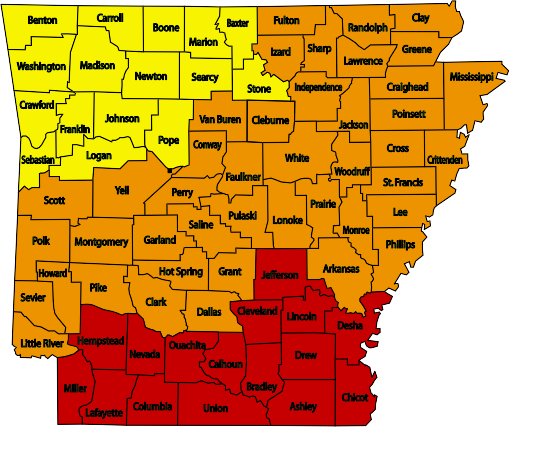“This is especially important in communities — including rural and urban — that may have reduced access to food,” Weaver said. “Furthermore, many markets actively incorporate programs such as SNAP and Double Up Food Bucks, to assist lower-income shoppers with purchasing food.”
To recognize the efforts of local growers and markets, Arkansas Deputy Agriculture Secretary Cynthia Edwards delivered Gov. Sarah Huckabee Sanders’ proclamation of June 11-17 as Arkansas Farmer’s Market Week.
On June 9, Edwards shared the proclamation with a crowd of community members, Arkansas Department of Agriculture staff, representatives from hunger relief organizations, members of the media and other stakeholders who braved the rain to gather at Oak Forest Community Garden in Little Rock.
“We are happy that you’re here, and we’re very excited that Governor Sanders proclaimed next week, June 11 through 17, as Arkansas Farmer’s Market Week,” Edwards said. “It’s one of our favorite events at the Department of Agriculture. We love celebrating our farmer’s markets.”
Edwards said there are 112 farmer’s markets in Arkansas with 1,500 farmers providing goods with a value in direct-to-consumer sales of over $9 million.
Weaver said fresh produce and other market products sold at farmer’s markets are significantly less likely to be impacted by supply chain disruptions, such as those that occurred during the COVID-19 pandemic.
“Supply chains can be easily disrupted and cause long delays in products reaching consumers,” Weaver said. “The closer a product is to the consumer and the fewer hands it has to go through to get to them, the less likely it will be affected by these disruptions. This is especially important for something so basic as food, which we all need every day. Buying local not only feels good in many ways, it’s also a smarter choice for our long-term success.”
Local, fresh food for local communities
Edwards presented the proclamation to Katrina Betancourt, president and executive director of the Arkansas Coalition for Obesity Prevention, the umbrella organization for the Arkansas Farmer’s Market Association. The group administers Double Up Food Bucks, a program that doubles the dollars for recipients of SNAP — the Supplemental Nutrition Assistance Program, formerly known as food stamps — to purchase locally grown produce at many farmer’s markets and stands.
“Our organization is a coalition made up of other organizations, farmers, vendors and consumers,” Betancourt said. “Thank you again — every single one of you here is receiving this proclamation.”
Mark Nelson, garden and market manager for the Oak Forest Community Garden, also thanked attendees and emphasized the importance of supporting local farmer’s markets.
“We’re a small market, we’re tucked away in the neighborhood here, but we really take a lot of pride in what we do — being able to support access to healthy and fresh foods for the neighborhoods around here, participating in Double Up Food Bucks, and just to be a space for a growing community,” Nelson said. “The money that people spend at the University District Farmer’s Market goes right back into this garden. It helps support what we do, the programming we have and the work that we’re doing with other community partners to make this space into a truly communal space.”
Weaver said research has shown linkages and even positive outcomes between access to healthy, fresh food — including fruits and vegetables — and reduced chronic disease and mental health burdens in society.
“In addition to the societal health benefits, markets offer another sales channel for our state’s farmers, growers, and food producers,” Weaver said. “Not only are shoppers making a purchase that directly provides income to these folks, but the indirect benefits of community relationship building and buyer education about agriculture products also support the state’s agricultural industry.”
To learn about extension programs in Arkansas, contact your local Cooperative Extension Service agent or visit www.uaex.uada.edu. Follow us on Twitter and Instagram at @AR_Extension. To learn more about Division of Agriculture research, visit the Arkansas Agricultural Experiment Station website: https://aaes.uada.edu. Follow on Twitter at @ArkAgResearch. To learn more about the Division of Agriculture, visit https://uada.edu/. Follow us on Twitter at @AgInArk.



















